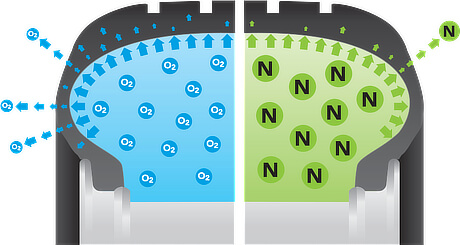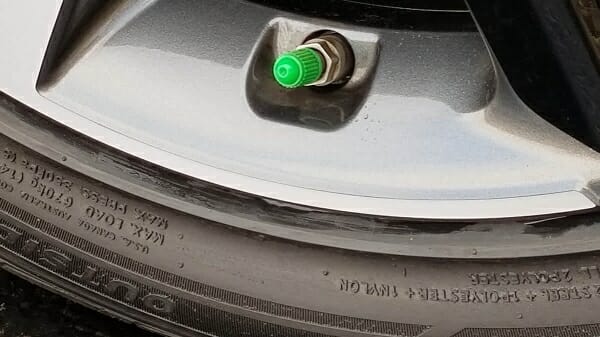
Presumably nitrogen-filled tires would save us from our own laziness but at a price. It is a fact that fuel mileage is increased by maintaining tire pressures.

A cooler properly inflated tire offers lower rolling resistance compared to a hot underinflated tire.
Why put nitrogen in tires. Because nitrogen is more stable than oxygen it is common in the tires of vehicles that require more precision tuning such as race cars industrial machinery aircraft and spacecraft. The NHTSA study also found that regular air escapes tires at a higher rate than pure nitrogen. The government agency concluded that using nitrogen does reduce tire degradation by limiting.
Improperly inflated tires can wear unevenly wear out faster and ruin your fuel economy. Simply put pure nitrogen does a better job of maintaining the right tire pressure thus enabling your car. Presumably nitrogen-filled tires would save us from our own laziness but at a price.
When air is pressurized the humidity in it condenses to a liquid and collects in. Nitrogen does offer some advantages over regular compressed air when filling tires. Since the molecules that comprise nitrogens chemical structure are larger than oxygens molecules nitrogen is.
Nitrogen is an inert gas which can lead to some benefits over regular air. First it less likely to migrate through tires than oxygen keeping the pressure of your tires more stable with. Nitrogen in comparison provides a dryer inflation.
The absence of moisture in dry nitrogen ensures a more steady temperature inside the tire. This is why nitrogen tires are common on race cars. With more stable tire pressure the thinking goes youll get better gas mileage and get full tire life since youre always rolling on fully inflated tires.
Claims are also made that nitrogen in tires prevents tire rot by limiting the moisture that naturally occurs inside tires and heads off corrosion of the wheel that can be caused by contact with moisture. The main advantage of using Nitrogen in tires is less pressure growth as the tire heats up. And the reason that nitrogen suffers from less pressure growth is primarily due to one thing.
Tires with nitrogen keep the proper pressure longer. This means youll spend less time filling your tires. Additionally a properly inflated tire lasts longer and offers better fuel economy.
Further nitrogen fill systems are dry and dont dispense water vapor into the tire. The nitrogen allows the tires to maintain an optimal tire pressure over a greater period of time. It is a fact that fuel mileage is increased by maintaining tire pressures.
However many people do not monitor tire pressure on a consistent basis. Considering that compressed air can contain as much as 5-percent water maintaining proper tire pressures can be achieved easily by running nitrogen in tires rather than compressed air. Just about every race car airplane and heavy equipment tire is filled with nitrogen.
These vehicles subject tires to extreme temperature conditions and the use of nitrogen allows better control over tire pressure as tire temperature increases. Compressed air holds moisture and the amount of moisture may vary from tire to tire. The greatest benefit of nitrogen tire inflation compared to standard compressed airor the type of air youd typically find at the air pump at your local gas stationis that nitrogen may help keep tires inflated longer.
Its a matter of basic chemistry. Standard compressed air is composed of the same air we breathe. Thats said to give you several advantages if you put it in your tires.
They say the oxygen in the air degrades the rubber more than nitrogen does. They say nitrogen molecules are slightly larger than oxygen molecules in the air so its less likely to leak through the rubber. Due to the fact that a Nitrogen inflated tire stays properly inflated for a longer period of time fuel economy is improved.
A cooler properly inflated tire offers lower rolling resistance compared to a hot underinflated tire. In fact government studies show that up to 6 loss of fuel economy can result from underinflated tires. There are multiple reasons why nitrogen is preferable to air in automobile tires.
Better pressure retention leading to increased fuel economy and improved tire lifespan Cooler running temperatures accompanied by less pressure fluctuation with temperature change Less tendency toward wheel rot. Nitrogen-filled tires are said to maintain pressure better than tires filled with compressed air. This is because air escapes out of the tire at a faster rate.
Nitrogen is less permeable than oxygen because of its larger molecule size. Nitrogen is a gas that does not support combustion therefore in case of an extremely overheated tire catching fire nitrogen makes for much better safety than regular air which contains oxygen that supports combustion. Filling nitrogen in tires also helps in keeping the insides of the tire cool even at high speeds.